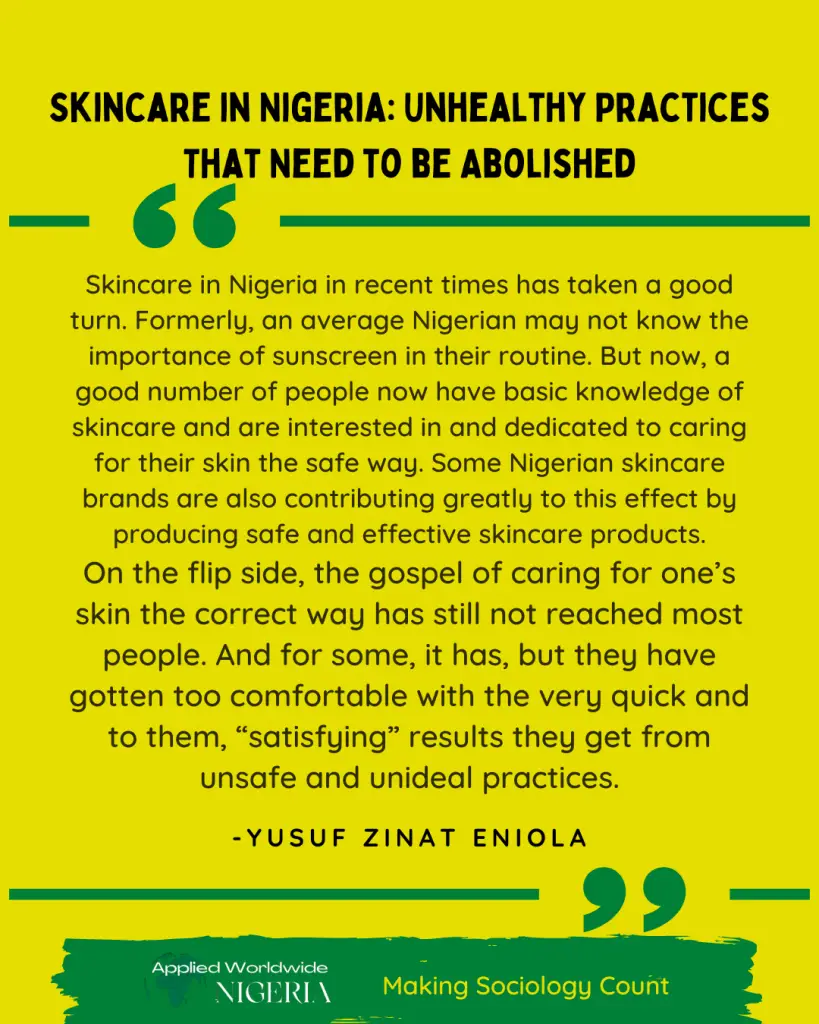Skincare in Nigeria in recent times has taken a good turn. Formerly, an average Nigerian may not know the importance of sunscreen in their routine. But now, a good number of people have basic knowledge of skincare and are interested in and dedicated to caring for their skin the safe way. Some Nigerian skincare brands are also contributing greatly to this effect by producing safe and effective skincare products.

On the flip side, the gospel of caring for one’s skin the correct way has still not reached most people. And for some, it has, but they have gotten too comfortable with the very quick and to them, “satisfying” results they get from unsafe and unideal practices.
In this article, I’ll be analyzing some of the most common skincare practices that need to be abolished in Nigeria.
Unsafe and unhealthy skin care practices in Nigeria
1. Preference for organic skincare products

Many Nigerians prefer using organic skincare products because they believe it is formulated strictly with natural ingredients, hence safe. In the real sense, skincare products are formulated with natural ingredients doesn’t necessarily mean it is safer and more effective. The use of Nigerian organic skincare products is particularly frowned upon by skincare experts because of their sketchy formulation process. Most of their formulas often contain steroids and other undisclosed ingredients that shouldn’t be on your skin to breed faster results.
These products are also often formulated in unsterile environments into unsterile packaging.
Some organic skincare brands in Nigeria also don’t place priority on skin health, rather, importance is placed on appearance. This is why they mostly make products that will “brighten the skin in 7 days or less” with no regard for the harmful side effects of ingredients added. An easy way to fish out a sketchy skincare brand is through the following ways;
● If their ingredients list is undisclosed
● If their products promise results in 7 days or less
● If they have products that are formulated specifically for a particular skin color
● If they produce “bleaching” products
● If their formulation process is questionable
● If they claim one product works for several skin concerns.
These signs are often common in these brands. We should endeavor to look out for them before making a purchase.
2. Skincare in Nigeria DIY practices

Another practice that should be discontinued is DIY skin care practices. The application of lemons, honey, turmeric, raw eggs, and toothpaste topically on the skin especially is prevalent. It is not advised to use these items directly on your skin. They can lead to skin irritations, breakouts, and sensitivity. Lemon and toothpaste especially, can alter the PH level of your skin, disrupt the skin barrier and increase the skin’s sensitivity to the sun.
There’s no denying that you may find some of these ingredients in your kitchen in some skincare products. The difference is that those ingredients are formulated by experts with other elements that complement one another. They also add preservatives to these formulations to prevent bacteria from growing in them. We clearly don’t have a scientific understanding of formulating products by ourselves, so instead of taking the risk, you should rather enjoy and benefit from the nutrients of food items by consuming them.
3. Misusing steroid creams
Steroid creams and triple-action creams are medicated creams that aim to target some skin concerns like eczema, psoriasis, and dermatitis. They are mostly prescription creams and are not meant to be used for a long duration. Most people however seem to misuse it by mixing it with creams or by using it for a long period of time mainly because they lighten or “bleach” the skin. Many bleaching creams also contain these steroids.
What most people don’t know is that prolonged use of these creams has negative side effects. Stopping its use after a long period also causes bad withdrawal syndromes. They can cause thin skin, redness, itchiness, acne, stretch marks, and skin discoloration among many others. The misuse of these creams can also cause serious health complications that can affect kidney function.
4. Not using sunscreen as skincare in Nigeria

There’s a common saying that black doesn’t crack. The truth is, black skin definitely won’t crack only if it receives the proper and adequate care and protection. And the secret to that is the consistent use of sunscreen. Everyone needs sunscreen regardless of race and skin tone. Many Nigerians may stash their drawers with different lotions and oils but will leave out sunscreen. This is because most people don’t know its importance or the disadvantages of not using it.
Using sunscreen reduces the signs of aging, protects the skin from harmful sun rays, prevents sunburn, and reduces the risk of having skin cancer. It also makes other products in your routine more effective.
5. Having no routine at all
While it is commendable that you are not using any harmful product on your skin, having no routine at all is not any better. Some people only use their regular antiseptic soap and then go ahead to use Vaseline or ori (shea butter) as their cream. And some use nothing at all. This is prevalent in people that have no skin issues. Having no skin issues does not mean you should not have a routine or stick to products that won’t do much for your skin. It also doesn’t equate to having healthy skin. Having a routine is important to keep your skin healthy now and in the coming years.
Final Thoughts on Skincare in Nigeria
For healthy skin, the practices above should be discontinued. If the side effects from these practices are not enough to ward you off, the health complications that come with some of them should. We should seek the proper and safe way to attain healthy skin. The three basic products you need for that especially if you don’t have any skin concern is a gentle cleanser, a moisturizer, and sunscreen with SPF 30 or higher.
It is also important to know your skin type as this will guide you in picking a befitting product. If you have a skin concern or issue, or you’re confused about how to curate a routine, you should visit a skincare consultant. A skincare consultant is a professional that can help you determine your skin type, skin concerns, and needs and also help you curate a routine in line with that.




